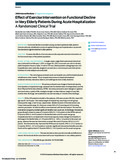Mostrar el registro sencillo del ítem
Effect of exercise intervention on functional decline in very elderly patients during acute hospitalization: a randomized clinical trial
| dc.creator | Martínez Velilla, Nicolás | es_ES |
| dc.creator | Casas Herrero, Álvaro | es_ES |
| dc.creator | Zambom Ferraresi, Fabrício | es_ES |
| dc.creator | López Sáez de Asteasu, Mikel | es_ES |
| dc.creator | Lucía, Alejandro | es_ES |
| dc.creator | Galbete Jiménez, Arkaitz | es_ES |
| dc.creator | García Baztán, Agurne | es_ES |
| dc.creator | Alonso Renedo, Javier | es_ES |
| dc.creator | González Glaría, Belén | es_ES |
| dc.creator | Gonzalo Lázaro, María | es_ES |
| dc.creator | Apezteguía Iráizoz, Itziar | es_ES |
| dc.creator | Gutiérrez Valencia, Marta | es_ES |
| dc.creator | Rodríguez Mañas, Leocadio | es_ES |
| dc.creator | Izquierdo Redín, Mikel | es_ES |
| dc.date.accessioned | 2019-09-10T07:47:43Z | |
| dc.date.available | 2019-11-12T00:00:11Z | |
| dc.date.issued | 2018 | |
| dc.identifier.issn | 2168-6106 | |
| dc.identifier.uri | https://hdl.handle.net/2454/34781 | |
| dc.description.abstract | Importance: Functional decline is prevalent among acutely hospitalized older patients. Exercise and early rehabilitation protocols applied during acute hospitalization can prevent functional and cognitive decline in older patients. Objective: To assess the effects of an innovative multicomponent exercise intervention on the functional status of this patient population. Design, Setting, and Participants: A single-center, single-blind randomized clinical trial was conducted from February 1, 2015, to August 30, 2017, in an acute care unit in a tertiary public hospital in Navarra, Spain. A total of 370 very elderly patients undergoing acute-care hospitalization were randomly assigned to an exercise or control (usual-care) intervention. Intention-to-treat analysis was conducted. Interventions: The control group received usual-care hospital care, which included physical rehabilitation when needed. The in-hospital intervention included individualized moderate-intensity resistance, balance, and walking exercises (2 daily sessions). Main Outcomes and Measures: The primary end point was change in functional capacity from baseline to hospital discharge, assessed with the Barthel Index of independence and the Short Physical Performance Battery (SPPB). Secondary end points were changes in cognitive and mood status, quality of life, handgrip strength, incident delirium, length of stay, falls, transfer after discharge, and readmission rate and mortality at 3 months after discharge. Results: Of the 370 patients included in the analyses, 209 were women (56.5%); mean (SD) age was 87.3 (4.9) years. The median length of hospital stay was 8 days in both groups (interquartile range, 4 and 4 days, respectively). Median duration of the intervention was 5 days (interquartile range, 0); there was a mean (SD) of 5 (1) morning and 4 (1) evening sessions per patient. No adverse effects were observed with the intervention. The exercise intervention program provided significant benefits over usual care. At discharge, the exercise group showed a mean increase of 2.2 points (95% CI, 1.7-2.6 points) on the SPPB scale and 6.9 points (95% CI, 4.4-9.5 points) on the Barthel Index over the usual-care group. Hospitalization led to an impairment in functional capacity (mean change from baseline to discharge in the Barthel Index of -5.0 points (95% CI, -6.8 to -3.2 points) in the usual-care group, whereas the exercise intervention reversed this trend (1.9 points; 95% CI, 0.2-3.7 points). The intervention also improved the SPPB score (2.4 points; 95% CI, 2.1-2.7 points) vs 0.2 points; 95% CI, -0.1 to 0.5 points in controls). Significant intervention benefits were also found at the cognitive level of 1.8 points (95% CI, 1.3-2.3 points) over the usual-care group. Conclusions and Relevance: The exercise intervention proved to be safe and effective to reverse the functional decline associated with acute hospitalization in very elderly patients. Trial Registration: ClinicalTrials.gov identifier: NCT02300896. | en |
| dc.description.sponsorship | This study was funded by a Gobierno de Navarra project Resolución grant 2186/2014 and acknowledged with the “Beca Ortiz de Landázuri” as the best research clinical project in 2014, as well as by a research grant PI17/01814 of the Ministerio de Economía, Industria y Competitividad (ISCIII, FEDER). Dr Lucia is funded by ISCIII and Fondos FEDER (PI15/00558). | en |
| dc.format.extent | 8 p. | |
| dc.format.mimetype | application/pdf | en |
| dc.language.iso | eng | en |
| dc.publisher | American Medical Association | en |
| dc.relation.ispartof | Jama Internal Medicine 2019;179(1):28-36 | en |
| dc.rights | © 2018 American Medical Association. All rights reserved. | en |
| dc.subject | Functional decline | en |
| dc.subject | Very elderly patients | en |
| dc.subject | Acute-care hospitalization | en |
| dc.title | Effect of exercise intervention on functional decline in very elderly patients during acute hospitalization: a randomized clinical trial | en |
| dc.type | info:eu-repo/semantics/article | en |
| dc.type | Artículo / Artikulua | es |
| dc.contributor.department | Ciencias de la Salud | es_ES |
| dc.contributor.department | Osasun Zientziak | eu |
| dc.rights.accessRights | info:eu-repo/semantics/openAccess | en |
| dc.rights.accessRights | Acceso abierto / Sarbide irekia | es |
| dc.embargo.terms | 2019-11-12 | |
| dc.identifier.doi | 10.1001/jamainternmed.2018.4869 | |
| dc.relation.publisherversion | https://doi.org/10.1001/jamainternmed.2018.4869 | |
| dc.type.version | info:eu-repo/semantics/publishedVersion | en |
| dc.type.version | Versión publicada / Argitaratu den bertsioa | es |


